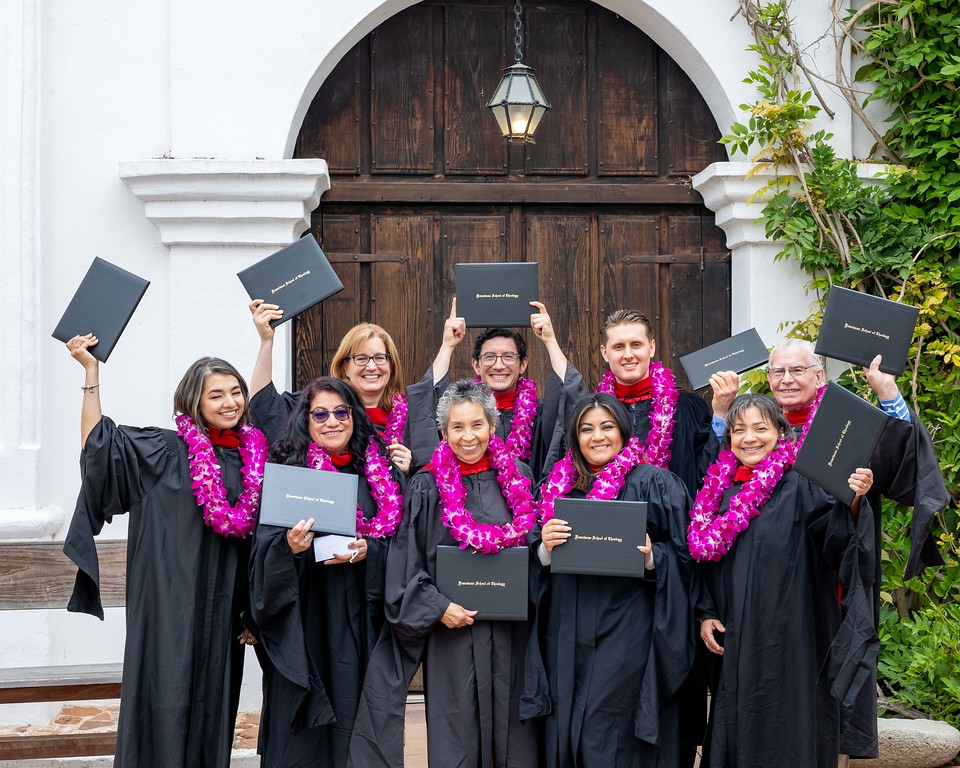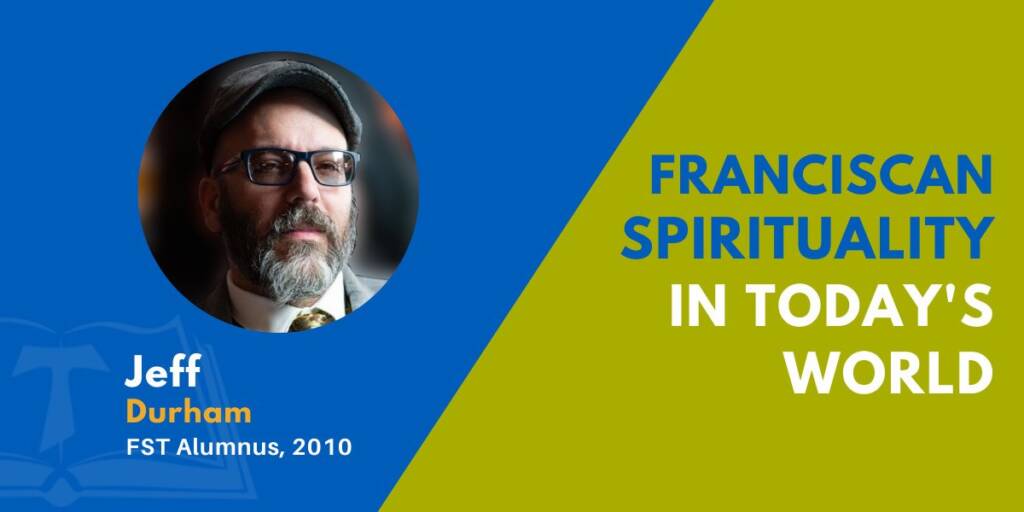When we think about how we live out our faith, a sanctuary or other physical worship space may first come to mind. But opportunities to deepen our faith can come to us anywhere — especially in nature, where the beauty of God’s creation is on full display. Religious scriptures and tradition invite us to recognize God’s handiwork in creation; for those who practice eco-spirituality, faith is connected directly to the natural world and humankind’s place in it. This is especially pertinent when it comes to how our actions affect our environment.
Pope Francis’ encyclical Laudato si’ is often called the “ecological encyclical” for this very reason, since it directly addresses our responsibility to care for our planet amid the twin crises of global poverty and climate disruption. In following Pope Francis’ practical recommendations for living a “greener” life, all people are called to connect authentically with the natural world, which can inspire a deeper sense of spirituality and help us understand our place in the cosmos.
Our Connection to the Natural World
Whether we are active in a faith community or not, connecting to nature can bring countless benefits to our lives. We may also find that some people define their spiritual relationship to nature differently than others.
Connecting to nature can look like:
- Observing and learning about the ways in which different species rely on one another to survive and thrive.
- Watching and respecting major natural forces at work (from a safe distance), including hurricanes, volcanoes, waterfalls, etc.
- Caring for injured, sick, or abandoned animals.
- Paying respect to animals or plants that have sacrificed to provide for us.
- Consciously using our senses to experience all facets of the material world — sight, sound, touch, taste, and smell.
- Acknowledging that humans do not own nature, and that natural forces at work are much larger than we can comprehend or control.
- Understanding that humankind is not separate from nature, but rather an intrinsic part of it.
An authentic connection with nature can often inspire questions we never thought to ask before — about our purpose, our earthly responsibilities, and even our very existence. Many of these questions may not have satisfactory or clean answers, but, as even St. Francis experienced, engaging with neither faith nor nature necessarily provides easy solutions.
Nature as a Spiritual Resource
From the beginnings of civilization, humans have revered and celebrated nature as the source (and destroyer) of all things. Nearly every culture has a creation myth featuring some element of the natural world. Even today, most major religions can point to a tradition or parable rooted in the material world — take Moses and the Red Sea, Abraham and the land of Canaan, Muhammad and the Black Stone. While evidence of the divine in our lives may not be as tangible as it is in Scripture, the faithful know that divinity infuses everything around us. St. Francis himself embodied this in taking a decidedly earthly approach to his spirituality, demonstrating a love of all creatures and a devotion to the natural world.
But before we look to nature as a resource, we must acknowledge that there are communities around the globe that do not have equitable access to the same resources. Educator, author, and Franciscan Friar Dr. Keith Douglass Warner writes for the Irish Examiner that “[the] practical need to protect our planet’s climate system is very real, but so too is the moral outrage of billions of human beings denied access to the goods needed for a dignified life.” Therefore, in addition to using nature as a “free” spiritual resource, those of us with privilege are obligated to work to expand access to natural resources like clean water, renewable energy, healthy foods, and clean air.
In Laudato si’, Pope Francis introduced the term “integral ecology,” which encapsulates this mutual responsibility of humankind to ensure all can benefit from God’s creation. This concept, according to Dr. Warner, “invites all of us — Catholics, communities of faith, and persons opposed to religion — to take stock of our common humanity and deepen our understanding of our dependence upon the Earth’s life support systems.” This approach gives science and religion equal credence, wherein religion serves as a way to derive meaning from chaos.
The Spiritual Naturalist Society positions eco-spirituality as a combination of naturalism and spiritualism: while many natural events have a concrete explanation rooted in science, there are some things about our world that we can never understand or explain. No matter our religion, we can draw upon nature as a grounding spiritual force through:
- Observation (versus control)
- Acceptance (versus resistance)
- Curiosity (versus demanding answers)
- Sharing (versus possessing)
- Celebration (versus objectification)
Some people look to the wilder side of nature to inspire and strengthen their faith, such as scaling jaw-dropping heights or deep sea diving. Those who have lived through unforgettable (or harrowing) natural events sometimes compare the experience to a religious awakening.
Related Resource: Franciscan Wisdom in an Age of Science with Dr. Ilia Delio, OSF
Spiritual Benefits of Strengthening Your Relationship With Nature
“In its turn, humanity realizes the perfection of the material world and the Incarnation sublates this perfection into redemption in which the first was joined to the last and God joined to clay. Christ is the high point of the world, of the cosmos and of history as its center.”
– Kevin Michael Tortorelli, OFM
When we understand our place in the universe, we begin to experience the benefits of a strong connection between spirituality and nature. This connection can result in:
- A greater appreciation for things as they are
- More awareness and knowledge of sustainable practices
- A better understanding of time, its rhythms, and limitations
- Experiencing the true meaning of humility
- Less stress from trying to control things around us
- Greater respect for things once taken for granted
- Increased gratitude for simple gifts
- Selflessness and an urge to share your blessings with others
- Clarity of purpose
- Better self-care practices and improved wellbeing
- More compassion, empathy, and patience
- An expanded worldview
- A greater sense of acceptance
- Less time, money, and energy spent on material things
- Seeing and appreciating beauty in imperfection
Common Barriers to Connecting With Nature
“I am happy to read in Laudato si’ that conversion has everything to do with spiritual richness, the renewal of humanity, and ‘an interior impulse which encourages, motivates, nourishes and gives meaning to our individual and communal activity.’ Profound inner change is directly connected to communion with all that surrounds us. Overall personal conversion ‘calls for a number of attitudes which together foster a spirit of generous care, full of tenderness.’”
– Krijn Pansters
Just like there is no one right way to express Franciscan spirituality, there is no right way to connect with nature. Even when we experience physical barriers to nature, we can still maintain an attitude of interconnectedness with all of creation that stays with us wherever we are.
Modern life is often not conducive to immersing oneself in nature in the literal sense. Constant digital connectivity, a non-stop flow of news, and the ability to find answers in a split second means there’s no real need to rely on nature for information or entertainment. Not to mention, many of our jobs keep us indoors, stationary for long periods of time, and too busy to think of anything else besides work.
This is where a real commitment to making space for spirituality comes in. If you struggle to access feelings of wonder or gratitude at work, take a bit of the natural world inside with you. A bouquet of hand-picked flowers in a vase, a rock from a memorable vacation, or a fallen feather can serve as small, tangible reminders of the world beyond our day-to-day. With practice, even the busiest among us can find room in our lives to marvel at the beauty of creation.
7 Ways to Connect With Nature
- Head outside It sounds overly simple, but the first step to connecting with nature is to step outside. Gardens, parks, beaches, state forests, and nature preserves put the beauty of the outdoors front and center, where you can easily see God’s hand at work. If you don’t have access to places like these, try going somewhere with at least fresh air and a clear view of the sky — sometimes a deep breath of clean air is enough to ground us.
- Practice care for creation Caring for the natural world can take many forms: planting and tending a garden, advocating for green energy and conservation, caring for animals, or serving people on the margins of society, to name a few. Franciscan Catholics are compelled to practice solidarity with the natural world through practical acts in service of others, just like St. Francis did in his lifetime.
- Practice wonder Children remind us what it’s like to experience the world for the first time. If you’ve ever watched a child move through the world, you know that the smallest things fascinate them — a bubble, a dandelion puff, a handful of sand. Try reconnecting with your inner child and appreciate the wonder that’s all around you.
- Minimize your life Minimalism has become an aesthetic trend in recent years, but saints and the faithful have been practicing intentional minimalism for millennia. While you don’t need to take a vow of poverty, try to pare down your belongings to only what you need. Remember that we can’t take any of our things with us when we die; if you feel a deep attachment to your belongings, try shifting that focus to prioritize your loved ones and your own personal (spiritual) gifts.
- Go green (or greener) You may not be able to live off the land full-time, but we can all do our small part to support our planet’s health. Recycling, composting, solar power, and electric vehicles are a great start to sustainable living. You may also find ways to take it further — lobbying your local politicians for greener legislation, learning and educating others about our environmental impact, or joining green initiatives that help marginalized communities at the same time.
- Remove barriers Life can be hard, and many people feel the need to shut out the “bad” parts. Alcohol, drugs, food, shopping, excessive exercise — many of us rely on temporary distractions to cope with uncomfortable challenges. To fully connect with the world as God made it (including ourselves), we need to confront our discomfort and acknowledge our most difficult emotions; only then can we live honestly and practice openness. Prayer, meditation, and/or counseling can help remove harmful barriers to our truth.
- Give thanks Even if you’re not a “nature person,” you can give thanks for things that come naturally to you. For example, are you a good listener? Are you kind? Do you accept all people as they are? Though they may be intangible, these qualities are a natural part of your whole self, which is something to celebrate. You can also take time during your day to meditate on and give thanks for earthly gifts we may take for granted, such as fresh air, rain, sunlight, and food.
The beautiful thing about connecting faith to nature is that there are no rules. As long as you practice care for all creation, you can serve God wherever you are, whether that be in the garden, on the ocean, at work, in church, at home, or anywhere else you find yourself.
See overview: University of San Diego – Master of Theological Studies
If you’d like to delve deeper into practical applications or examinations of faith, consider exploring opportunities like the online Master of Theological Studies – Franciscan Theology at the University of San Diego. With a flexible schedule, remote accessibility, and experienced faculty, this community-oriented program helps students from all walks of life connect their faith to their personal and professional lives, whatever that may look like. To learn more, simply connect with an enrollment advisor and start your journey to understanding your place in the wider world.
Further resources on this topic:
- Care for Creation: A Franciscan Spirituality of the Earth Ilia Delio, OSF; Keith Douglass Warner, OFM; & Pamela Wood Franciscan Media 2020 This book outlines our contemporary environmental crises and explains how Franciscan eco-spirituality can guide our response.
- Laudato Si’: On Care for our Common Home Pope Francis Vatican Publishing House 2015 In this encyclical Pope Francis presents a primer in 21st century Catholic eco-spirituality.
- Developing Ecological Consciousness: Becoming Fully Human Christopher Uhl Rowman & Littlefield Publishers 2020 Uhl describes an ecological approach to our awareness of life.
- Remembering Francis: Making Sense of Modern Life Joachim Ostermann, OFM Franciscan Institute Publications 2021 Ostermann explores the simplicity and wisdom of St. Francis’ approach to life.
- Green Theology: An Eco-Feminist and Ecumenical Perspective Trees van Montfoort Darton Longman & Todd Ltd. 2022 A theological reconsideration of the relationship between God, creation, nature, and human beings.
- Franciscan Lectio: Reading the World Through the Living Word Dan Riley, OFM & Stephen Copeland Paraclete Press 2022 Contemplative prayer for the modern age.




